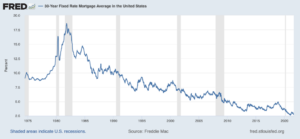Time to Refinance Your Mortgage?
Interest rates on bonds and mortgages remain low. This is not good news if you rely on the interest income from your savings but it’s great news if you have a home mortgage or other consumer loans that you may be able to refinance.
The rate on 10-year US Treasury bonds is currently 1.3%. We’ve come a long way from 1981 when 10-year Treasuries topped out at 16% and mortgage rates neared 20%. Readers of a certain age may remember the runaway inflation during the Ford, Carter and Reagan years. Readers of a younger age have no idea what I’m taking about and have no inflation fears.
If you’re wondering, here’s a picture of 30-year mortgage rates going back to when Jimmy Carter was president. Times have changed.

If you have a home mortgage and have not refinanced it in the last year or two, consider doing so now. Assuming your income, credit score, and home equity are sufficient, you’ll probably find a lower rate and this could amount to a significant savings on your monthly payment. You may also consider a shorter-term mortgage, get an even slightly lower rate, face an increased monthly payment but pay it off sooner.
Keep in mind that refinancing a mortgage involves incurring other closing costs such as points and various fees. Be careful to include these expenses into your calculation of determining whether the transaction makes economic sense and the “breakeven” date is sensible for your circumstances.
If you do refinance, I recommend that the term of your mortgage does not go out longer than your expected retirement date, unless you have sufficient retirement income (such as a pension) to cover the mortgage payment.
For those of you with credit card and other unsecured consumer debts, those rates are painfully slow to adjust downward with other interest rates. You may be able to refinance those loans but if not, focus on paying them off as quickly as you can.